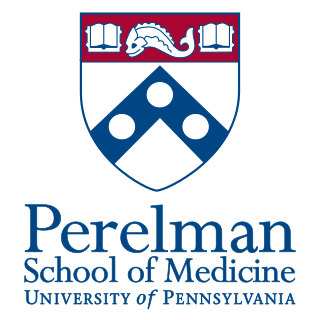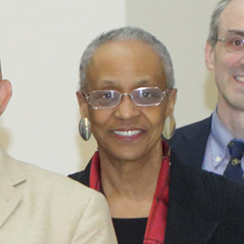Related Research Articles

The Perelman School of Medicine, commonly known as Penn Med, is the medical school of the University of Pennsylvania, a private research university in Philadelphia, Pennsylvania. Founded in 1765, the Perelman School of Medicine is the oldest medical school in the United States and one of the seven Ivy League medical schools.

Tianwen Tony Cai is a Chinese statistician. He is the Daniel H. Silberberg Professor of Statistics and Vice Dean at the Wharton School of the University of Pennsylvania. He is also professor of Applied Math & Computational Science Graduate Group, and associate scholar at the Department of Biostatistics, Epidemiology & Informatics, Perelman School of Medicine, University of Pennsylvania. In 2008 Tony Cai was awarded the COPSS Presidents' Award.
Xihong Lin is a Chinese–American statistician known for her contributions to mixed models, nonparametric and semiparametric regression, and statistical genetics and genomics. As of 2015, she is the Henry Pickering Walcott Professor and Chair of the Department of Biostatistics at Harvard T.H. Chan School of Public Health and Coordinating Director of the Program in Quantitative Genomics.
Kathryn Mary Chaloner was a British-born American statistician.
Mary Elizabeth (Betz) Halloran is an American biostatistician who works as a professor of biostatistics, professor of epidemiology, and adjunct professor of applied mathematics at the University of Washington.
Jane Menken, née Golubitsky, is an American sociologist and demographer known for her work in sociology in public and international affairs, population studies, social statistics.
Anita Kaplan Bahn was an American epidemiologist, biostatistician, and cancer researcher.
Margaret Merrell was an American biostatistician who taught at Johns Hopkins University for many years and became the first female full professor in the Johns Hopkins School of Public Health. She is known for her research with Lowell Reed on the construction of life tables. She also observed that, for longitudinal data on individuals, fitting a curve to each individual and then averaging the parameters describing the curve will typically give different results than averaging the data values of the individuals and fitting a single curve to the averaged data.
Motomi (Tomi) Mori is a Japanese biostatistician. Formerly the Walter & Clora Brownfield Professor of Cancer Biostatistics at the Knight Cancer Institute of Oregon Health & Science University (OHSU), she was named endowed professor and chair of biostatistics at St. Jude Children's Research Hospital in 2020. She is the chair of the Caucus for Women in Statistics for 2021.
Elizabeth Ray DeLong is an American biostatistician. She is a professor of biostatistics and bioinformatics at Duke University, where she chairs the Department of Biostatistics and Bioinformatics and is affiliated with the Duke Clinical Research Institute and Duke Cancer Institute.
Susan S. Ellenberg is an American statistician specializing in the design of clinical trials and in the safety of medical products. She is a professor of biostatistics, medical ethics and health policy in the Perelman School of Medicine at the University of Pennsylvania. She was the 1993 president of the Society for Clinical Trials and the 1999 President of the Eastern North American Region of the International Biometric Society.

Shiriki K. Kumanyika is an Emeritus Professor of Biostatistics and Epidemiology at the Perelman School of Medicine at the University of Pennsylvania and co-chair of the International Association for the Study of Obesity International Obesity Task Force. She has previously served as Associate Dean for Disease Prevention and was founding director of the University of Pennsylvania Master of Public Health. She chairs the African American Collaborative Obesity Research Network. She is the former president of the American Public Health Association.

Brian L. Strom - is inaugural Chancellor of Rutgers Biomedical and Health Sciences and the Executive Vice President for Health Affairs at Rutgers University. Strom was the Executive Vice Dean for Institutional Affairs, Founding Chair of the Department of Biostatistics and Epidemiology, Founding Director of the Center for Clinical Epidemiology and Biostatistics, and Founding Director of the Graduate Program in Epidemiology and Biostatistics, at the Perelman School of Medicine of the University of Pennsylvania. In addition to writing more than 650 papers and 15 books, he has been principal investigator for more than 275 grants. He was honored as one of the Best Doctors in America, for each of his last eight years at Penn.
Eva Petkova is a Bulgarian-American biostatistician interested in the application of statistics to psychiatry, and known for her research on regression model comparison, brain imaging, and mental disorders. She is a professor of population health and of child and adolescent psychology at the New York University School of Medicine, and a research scientist at the Nathan Kline Institute for Psychiatric Research.
Rebecca Allana Hubbard is an American biostatistician whose research interests include observational studies and the use of electronic health record data in public health analysis and decision-making, accounting for the errors in this type of data. She is a professor of biostatistics in the Perelman School of Medicine at the University of Pennsylvania.
Scarlett Bellamy is an American public health researcher who is a Professor of the Department of Epidemiology and Biostatistics at Drexel University. At Drexel she is Associate Dean of Diversity, Inclusion and Faculty Development.
J. Richard Landis is an American biostatistician and Emeritus Professor of Biostatistics in the Perelman School of Medicine at the University of Pennsylvania, where he is also the senior vice chair of the Department of Biostatistics, Epidemiology and Informatics, director of the Biostatistics Unit within the Center for Clinical Epidemiology and Biostatistics, and faculty Director of the Clinical Research Computing Unit.
Mingyao Li is a Chinese-American biostatistician and statistical geneticist known for her research on genetic factors related to heart disease, and as one of the creators of the ANNOVAR bioinformatics software tool. She is a professor of biostatistics in the Perelman School of Medicine at the University of Pennsylvania.
Emma Katherine Tara Benn is an American biostatistician whose research includes causal inference in health disparities as a way to help find targets for intervention against these disparities. She works at the Icahn School of Medicine at Mount Sinai, where she is an associate professor in the Department of Population Health Science, affiliated with the Center for Biostatistics. She is also associate dean of faculty well-being and development, and the founding director of the Center for Scientific Diversity at the Icahn School.
Judith D. Goldberg is an American biostatistician and a professor in the New York University Grossman School of Medicine. Her research interests include the statistics of medical tests used for screening and medical diagnosis, clinical trials, and observational studies.
References
- 1 2 "Mary D. Sammel Sc.D.", Our Faculty, Perelman School of Medicine at the University of Pennsylvania, retrieved 2017-11-12
- 1 2 "What Does Mary Sammel Do When She Is Not Being a Statistician?", Pastimes, Amstat News, American Statistical Association, June 1, 2017, retrieved 2017-11-12
- 1 2 Koren, Stanley (August 14, 2017), "Does "Tough Love" Produce Better Working Dogs?", Psychology Today
- ↑ Krowchenko, Leslie (December 9, 2015), Sammel family provides love and guidance to raise special dogs, Delco News Network
- ↑ ASA Fellows list, American Statistical Association, archived from the original on 2017-12-01, retrieved 2017-11-12